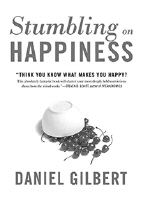Stumbling On Happiness -- By: Jeremiah Greever
Journal: Eikon
Volume: EIKON 03:1 (Spring 2021)
Article: Stumbling On Happiness
Author: Jeremiah Greever
Eikon 3.1 (Spring 2021) p. 150
Stumbling On Happiness
REVIEWED BY
Jeremiah Greever serves as Senior Pastor of First Baptist Church of Sedalia, Missouri, teaches as an adjunct professor for Missouri Baptist University, and is Committee Co-Chair for the Founders Midwest Conference. He is a columnist for the Missouri Baptist newspaper and is pursuing a D.Min. in Biblical Counseling.

Daniel Gilbert. Stumbling on Happiness. New York: Vintage Books, 2005.
Introduction
How can a person guarantee future happiness? In a postmodern society where pursuing happiness is the highest good, a book promising answers for predicting happiness has powerful appeal. It comes as no surprise that a relatable book on predictive happiness written by Daniel Gilbert, Professor of Psychology at Harvard University, became a National Bestseller. Gilbert’s aim is high as he writes to describe “what science has to tell us about how and how well the human brain can imagine its own future, and about how and how well it can predict which of those futures it will most enjoy” (xvii). Utilizing various scientific, psychological, and sociological studies, Gilbert convincingly argues for the importance of finding meaning and purpose in life. By considering such an intrinsic issue, Gilbert finds broad appeal to a diverse audience.
Summary
The crux of the book is the presumption that happiness is not self-determined or self-actualized but progressively realized. Understanding the shortcomings of subjective self-fulfillment, Gilbert accurately articulates the long-term failures of pursuing personal passions. Rather than blindly chasing happiness, Gilbert’s answer on happiness begins in one of the most unique aspects of the human brain — the ability to imagine. Whereas the natural world lives in the present, humans alone possess the ability to positively imagine the future and its emotional impact. And although predictive happiness begins with the human ability to imagine, Gilbert argues that the limitations of imagination require closer inspection.
Eikon 3.1 (Spring 2021) p. 151
Gilbert presents imagination’s unreliability through three labels — realism, presentism, and rationalization. Realism is our imagination’s filling in the gap of the unknown. Instead of painting accurate situational assessments, the human brain supplies context that inevitably are mistaken in response to our imagination’s blind spots. Gilbert warns against these brain blind spots concluding, “this tendency can cause us to misimagine the future events whose emotional consequences we are attempting to weigh” (102). The second label is presentism, which...
Click here to subscribe
